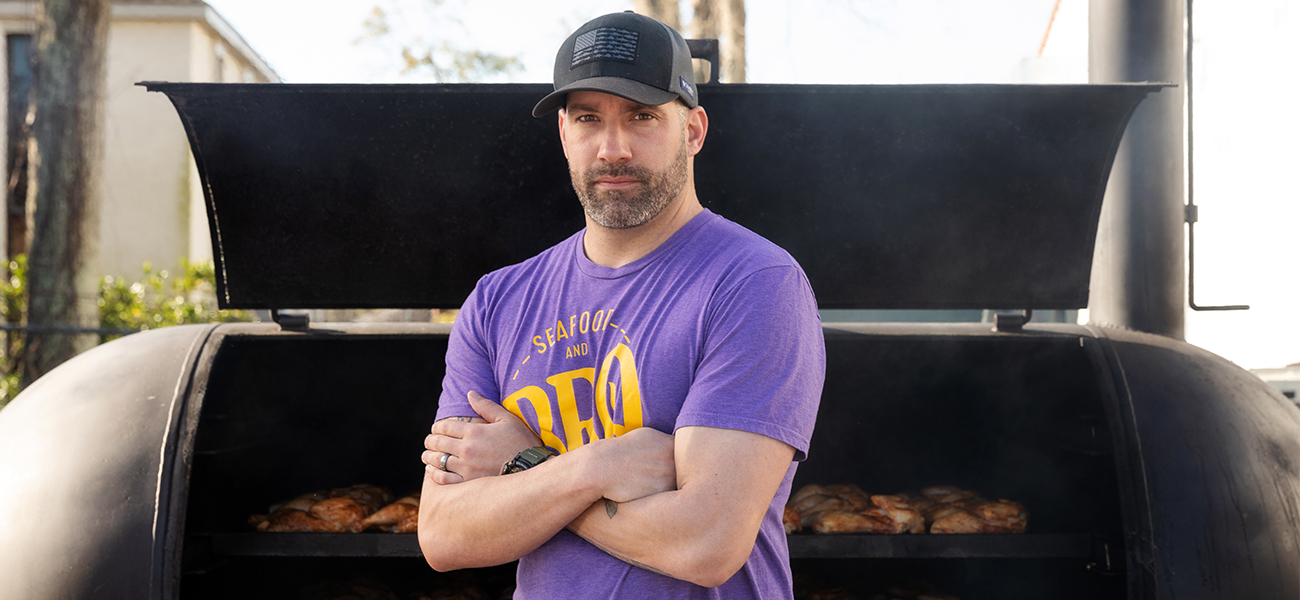
Baton Rouge BBQ: Talkin’ technique with BRQ chef-partner Justin Ferguson
Competition barbecue is all about sealing a win. From the spices that go into the dry rub, to the amount of time the meat spends in the smoker, that painstaking attention to detail sets it apart. But can you take the lip-smacking barbecue one might set before judges at an annual festival and bring it into a restaurant setting?
BRQ Seafood & Barbeque chef-partner Justin Ferguson has been captivated by this challenge since he returned to Baton Rouge to open his technique-driven barbecue restaurant in June 2017. Ferguson worked for several years in Chicago fine dining, sharing the same restaurant group as competition barbecue pitmaster Lee Ann Whippen and nationally known Southern cuisine expert chef Art Smith. He absorbed strategies for delivering a different kind of barbecue restaurant experience.
“Really good barbecue is probably the hardest thing to get right at a large scale, but that’s the beauty of it,” Ferguson says. “It means a lot to so many people because it’s an ancient form of cooking that’s just in our bones.”
|
|
We talked more with Ferguson about his techniques.
BRQ opened almost three years ago. What were you trying to accomplish with the concept?
When I was growing up in Baton Rouge, there were only a handful of restaurants that did a version of barbecue, but nobody was doing real competition barbecue. I got really interested in the idea of doing something like that, where a lot of attention is paid to the rubs, the sauces, how the meat is cut and sourced, and, of course, the cooking process. There’s a lot of science and precision to it, especially when you’re doing a couple thousand pounds of protein a week.
What are some of the competition-style techniques you deploy at BRQ?
We make all our own rubs and sauces. We use hickory and pecan wood for smoking, and we make sure the wood is super dry. We’ve got wood that will dry for six months before we use it. We have three different smokers, including a traditional barrel smoker that we use just for ribs. And we source our meats really carefully. We have our ribs cut a certain way. We also brine our chicken for 24 hours in a homemade brine before we smoke it, and we hand pull it.
Barbecue, of course, varies according to region. How would you describe Baton Rouge’s barbecue palate?
Baton Rouge is a brisket town. In general, people around here love steak and potatoes, and beef is also king when it comes to barbecue. We’ve also found that Baton Rouge diners prefer their barbecue really, really tender … falling off the bone. Real competition barbecue isn’t like that; you get more chew, so we had to adjust the way we were cooking early on. At the end of the day, you have to give people what they want.
How did you decide what kind of sauces to serve?
We do a variety to show different regional flavors. We have a South Carolina-style mustard-based sauce. We also do an eastern North Carolina vinegar-based sauce that’s great with pork because the vinegar cuts through the pork fat. We have our original mild, which is more like a Memphis- or Kansas City-style sauce and we have what we call Louisiana spicy, which is the original mild with more kick and spice. I wasn’t going to have a barbecue restaurant in Louisiana without a spicy sauce.
Why do you think barbecue is so popular here now?
Because barbecue is a great family tradition that everybody can relate to. It’s something people feel really passionate about, like the way we feel about our family gumbo recipes. And it’s been around forever. Thousands of years ago, there was probably some guy cooking over a fire saying, “Mine’s better than yours.” brqrestaurant.com
This article was originally published as part of our Baton Rouge BBQ cover story in the March 2020 issue of 225 Magazine. Click here to read more.
|
|
|
